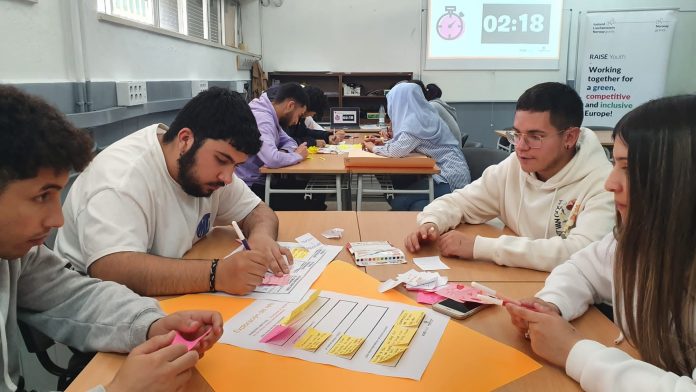For this special edition of the Youth Employment Magazine for the European Year of Skills 2023 and following the RAISE Youth philosophy of empowering youth and giving them the skills needed to improve their job prospects and encourage them to find (self) employment, we wanted to ask the trainers that have participated in the RAISE workshops and training programmes in Extremadura about their experience and what they think are the most important skills a trainer must have to engage with young NEETs and make them participate in the training sessions.
For the purpose of this article we asked a series of question to several trainers that have participated with the team of FUNDECYT-PCTEX in the formative activities organized within the framework of the RAISE Youth project and this is what they have to tell us:
- What are the most important skills a trainer should have when connecting with young people?
When asked this question, the trainers emphasized the importance of having high empathy and the need of refocusing training on more practical cases that put young people at the center of the learning process. When engaging with young people, it is important to keep their motivation and engage them in the learning process by active listening to them, having high communication skills and using youth-friendly resources that they feel comfortable using and are relevant for the training.
- What are the tools and resources that work best when connecting with young people in Extremadura?
The trainers mentioned that the tools and resources used when connecting with young people are not the priority, but where the trainers put the focus of the activity. From their point of view, we have to shift the focus from the trainer as the figure of authority and put it on young people, making them active agents in the training process, giving them more autonomy and relegating the figure of the trainer to a more supporting role, somebody young people can look for when needing advice but that does not constrain their learning process.
They also noticed that, when connecting with young people and making them engaged in the learning process, one of the methods that has proven to be most successful is the Bring Your Own Device (BYOD) approach. By allowing young people to bring things they are familiar with (i.e. their mobile phones) it is easier for them to participate, as trainers play on this familiarity to implement training activities. In conclusion, the main role of the trainer and the best way to connect with young people is to connect their emotions with the training process because, as the trainers interviewed summed up really well: “Without emotion there is no learning”.
- Is it important to know the business and social fabric of the region when working with young people?
When asked this question, they trainers main conclusion was that every training activity and initiative must be supported by the reality of each context. The trainers must know beforehand, at least on a superficial level, what are the particularities of the regions and communities they are working with and it is their job to connect the training with the territory. By knowing the problems, challenges and resources available and by letting young people share what do they perceive to be the direst problems in their communities and vicinities are currently facing, trainers can enable young people come up with ideas based on the territory, engage them by making the training based on their own perceptions and co-create a space where young people can freely exchange their ideas and, in conclusion, learn.
- How do you keep your skills up to date? Do you think it is important?
In regards to the upkeep of their skills one phrase I would like to highlight is: “We are always on beta, in order to be a trainer, you must always be getting trained in order to learn, you must know how to learn.” In order to connect with youth and keep up with their trends and interests, trainers must be where young people are, either in situ or online. By doing this, by being where youth are and by always learning new skills and relearning old ones, a trainer can successfully engage with young people and give them the training they may need.
- Is it important for young people to improve their skills?
It is of the utmost importance that young people keep on training and developing their skills. The trainers interviewed emphasized that we currently live in an everchanging environment and that is very necessary for young people to keep up to date with what is going on in the world. By having a set of well-developed skills to face the challenges that young people will face when accessing the labour market, young people will be able to properly address this challenges and problems and become more resilient to create a better world for everyone to live in.
Trainers also pointed out that when developing skills and getting trained there is not always a need of formal training because people can learn from every experience they have. Every skill can be transformed and upskilled and, by being willing to adopt this way of thinking, we can help young people improve their own skills and help them be better-equipped for the world we live in today.


